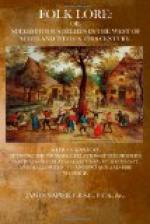Amethyst preserved from drunkenness.
Emerald promoted piety.
Sardonyx dispelled unholy thoughts.
There is a legend that God gave to Abraham a precious stone which had the power of preserving him from all kinds of sickness.
When any person was troubled with a morbid hunger accompanied with pain in the stomach, it was believed that that affliction was caused by the sufferer having swallowed some animal, which continued to live in the stomach, and that when this was empty it knawed the stomach and produced the pain felt. Several strange instances illustrative of the truth of this theory were current in my native village. Let one case suffice. An old soldier having on some long march been induced through extreme thirst to drink from a ditch, had swallowed some animal. Years after he was taken ill, and came home. His hunger for food was so great that he could scarcely be satisfied, and notwithstanding the great quantities of food which he consumed, he became thinner and thinner, and his hunger was accompanied with great pain. Doctors could do him no good. At length he met with a skilly old man, who told him that there was an animal in his stomach, and advised him to procure a salt herring and eat it raw, and on no account to take any drink, but go at once to the side of a pool or burn and lie down there with his mouth open, and watch the result. He had not lain long when he felt something moving within him, and by and bye an ugly toad came out of his mouth, and made for the water. Having drank its fill, it was returning to its old quarters, when the old soldier rose and killed it. Many in the village had seen the dead toad. After this the man recovered rapidly. Many other stories of people swallowing asks (newts), and other water animals which lived in their stomachs, and produced serious diseases, were current in my young days. This gave boys a great fear of stretching down and drinking from a pool, or even a running stream.
CHAPTER VII.
DIVINING.
There is another class of superstitions which have prevailed from ages the most remote to the present day, although now they are dying out—at least, they are not now employed to determine such important matters as they once were. I refer to the practice of divining, or casting lots. In early times such practices were regarded as a direct appeal to God. From the Old and New Testaments we learn that these practices were resorted to by the Jews; but in modern times, and among Western nations, the lot was regarded as an appeal to the devil as much as to God. I have known people object to the lot as a sinful practice; but, at the same time, they were in the constant habit of directing their own course by such an appeal, as, for instance, when they were about to travel on some important business, they would fix that, if certain events happened, they would regard such as a good omen from God, and would




